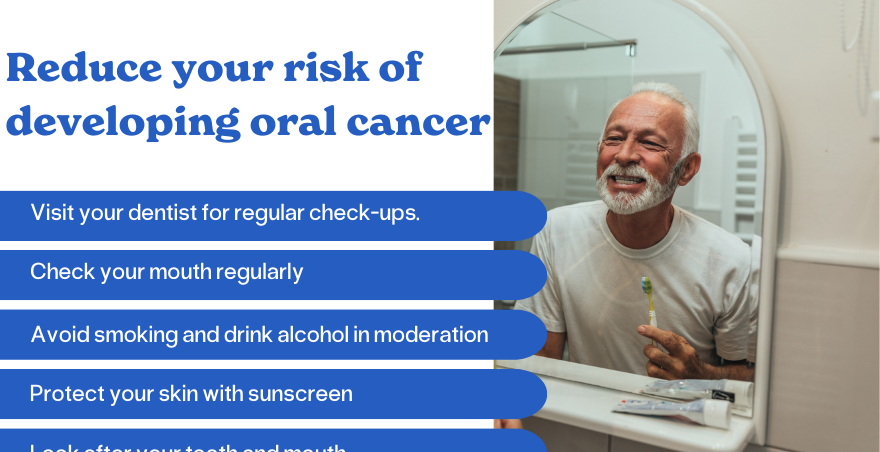 21 September 2022
21 September 2022
Oral cancer, also known as mouth cancer, includes any cancer that occurs within the mouth or surrounding tissues. Oral cancer can be extremely invasive and debilitating and like other cancers, does not discriminate. Cancer may present on or under the tongue, on the lips, the inside of the cheek, the gums, on the roof or floor of the mouth, and in the tonsils or salivary glands. While oral cancer can affect anyone, generally increasing risk from the age of 50, there are lifestyle choices that can often increase the risk of oral cancer.
There are many lifestyle factors known to increase the risk of oral cancer, including:
Smoking and Alcohol
Smoking is the most prevalent cause of oral cancer, causing around 59% of mouth cancer cases in Australia. In addition to this, around 31% are caused by excess alcohol consumption. Heavy alcohol use is when more than 4 standard drinks are consumed on a single occasion. The dehydrating effect of alcohol on the cell walls in your mouth helps the tobacco carcinogens to permeate the mouth tissues. In addition, the nutritional deficiencies associated with heavy drinking can lower the body’s natural ability to use antioxidants to prevent the formation of cancers.
Sun Exposure
Sun exposure to any part of your body including lips for an extended period of time can increase your risk of skin cancer. It is important when applying sunscreen to your face not to forget your lips. Use SPF lip balm and SPF sunscreen to protect against sun exposure and the risk of skin cancer which has a high risk of spreading.
Sexually Transmitted Virus
Human Papilloma Virus, otherwise known as HPV, is a common sexually transmitted infection that often has no symptoms and resolves on its own. However, when combined with other risk factors, about 60% of oropharyngeal cancers (cancers of the back of the throat, including the base of the tongue and tonsils) are caused by HPV. Risk factors that contribute to this high number include persistent infection, smoking, age, and a weakened immune system.
Symptoms of Oral Cancer
Early detection is key to receiving the correct and prompt treatment, should it be necessary. There are many varied symptoms of oral cancer and being on the lookout for anything new and unusual is important, especially if you notice any of the following:
- Red or white patches in your mouth or on or under the tongue
- Mouth ulcers that do not go away or a sore that does not heal or bleeds easily
- A lump or thickening of the skin or lining of the mouth
- Pain when swallowing or chewing, a painful tongue, or a pain in the neck that doesn’t go away
- A sore throat or hoarse voice
- Numbness anywhere in the mouth
- Jaw pain or stiffness
- Swelling in the mouth that persists
- A sensation that something is stuck in the throat
- Changes in speech
- Loose teeth
How you can reduce your risk of Oral Cancer
- Visit your dentist for regular check-ups. Dentists can assess your mouth thoroughly for abnormalities and are trained in detecting signs of oral cancer.
- Check your mouth regularly for any unusual sores or lesions.
- Avoid smoking and drink alcohol in moderation. Consume no more than two standard alcoholic drinks per day.
- Protect your skin with sunscreen, including your lips with SPF lip balm, and avoid getting sunburnt.
- Look after your teeth and mouth. Brush your teeth twice a day and floss once a day.
- Don’t delay in seeking advice from a dentist or medical professional if you notice any unusual symptoms or sores on your lips or in and around your mouth.
https://www.cancer.org.au/cancer-information/types-of-cancer/mouth-cancer
https://www.hpvvaccine.org.au/hpv-and-cancer/about-hpv-and-cancer#section-2
https://www.teeth.org.au/oral-cancer





